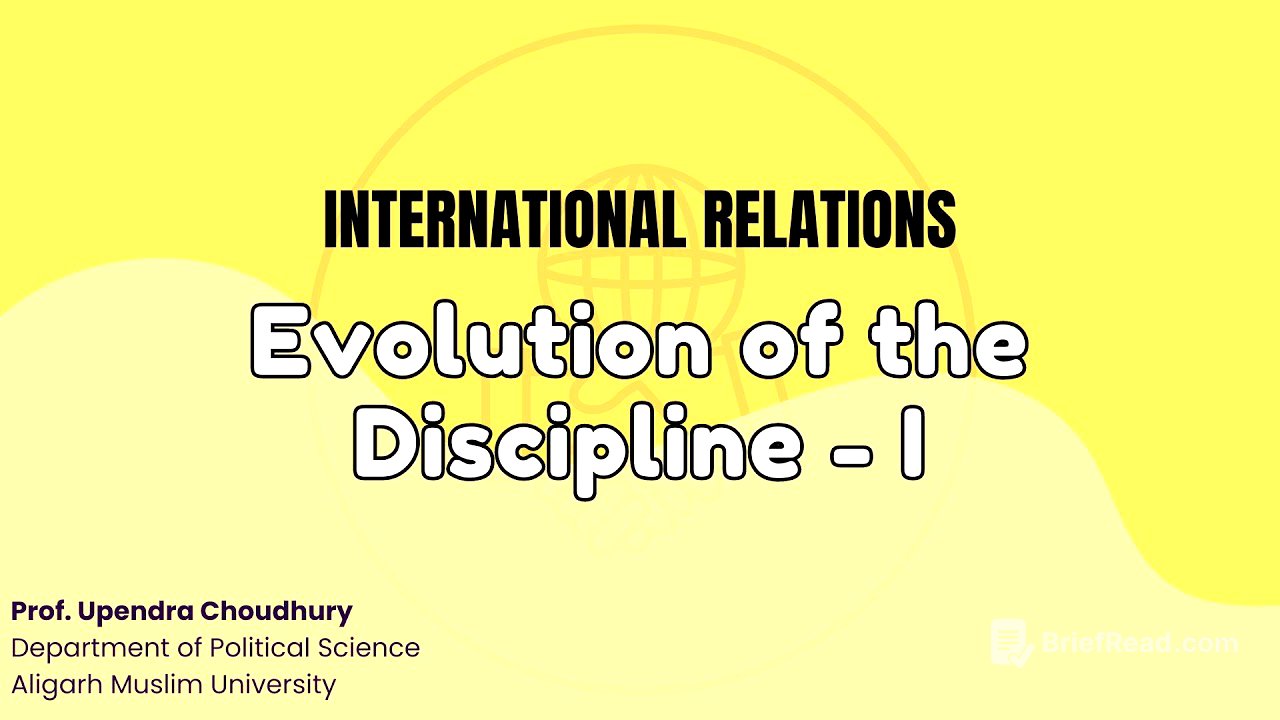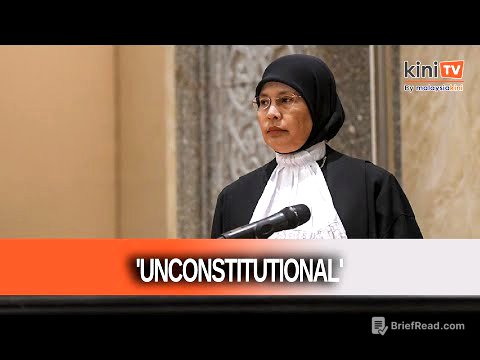TLDR;
This lecture discusses the evolution of International Relations (IR) as a discipline, exploring different traditions of thought, key historical events, and major debates that have shaped its development. It examines two approaches to understanding the discipline's evolution: one focusing on continuous traditions from ancient civilizations and the other on significant world events. The lecture also addresses criticisms of these approaches, particularly regarding their Eurocentric bias and neglect of non-Western perspectives.
- Understanding the evolution of IR helps to contextualize the subject and inform current scholarship.
- Key traditions of thought from ancient philosophers and historical events have significantly influenced the discipline.
- Great debates have shaped the theoretical and methodological approaches within IR.
Introduction: Understanding the Evolution of International Relations [0:15]
The lecture introduces the evolution of International Relations (IR) by examining different traditions of thought and significant international events that have contributed to its growth. The discussion will cover ways of understanding the discipline's evolution, various traditions of thought, five great debates from the interwar period, and concluding remarks. Understanding this evolution is crucial for grasping why we study the subject and how current scholarship is informed by past events and ideas. Two approaches to understanding the discipline include recognizing continuous traditions from ancient civilizations and focusing on significant world events that have shaped the field.
Ways of Understanding the Evolution of the Discipline [1:17]
There are two primary ways to understand the evolution of the discipline. The first approach emphasizes a continuous tradition of thought from ancient civilizations like India, China, Egypt, Rome, and Greece, which are considered integral to the field. Understanding current theories, concepts, and methodologies requires examining past events, ideas, and thoughts. The second approach focuses on significant world events, such as the treaties of Westphalia, European colonialism, World Wars I and II, and the Cold War, which have influenced the rise and fall of different theories and methodologies. This lecture will primarily consider the first approach, emphasizing the continuous tradition of thought.
Traditions of Thought Contributing to the Discipline [4:00]
International Relations, though considered a young discipline that emerged after World War I, has roots in nearly two millennia of recorded thoughts and actions. Works such as Sun Tzu's "The Art of War," Thucydides' "History of the Peloponnesian War," and Kautilya's "Arthashastra" have all influenced the discipline. Plato's class analysis and dialectical reasoning influenced Marxist thinkers and critical theories. Machiavelli's focus on a value-free science of statecraft and foreign policy making is a key part of realist theory. Hobbes' concept of a social contract and Kant's theory of Perpetual Peace have also contributed significantly. Locke's emphasis on natural rights and limited government influenced liberal scholars, while Marx's critique of economic power provided a foundation for later developments. Despite their contributions, these scholars often described actors differently and did not limit themselves to external relations of states, focusing more on domestic politics and citizens' rights and duties.
The Great Debates Shaping International Relations [7:50]
International Relations was recognized as a separate discipline during the interwar period (1919-1939), marked by successive great debates on what and how to study, contributing to its transformation. The first great debate was between interwar idealists and postwar realists. Idealists aimed to reform international politics to prevent future wars through international institutions, while realists dismissed this as utopian, emphasizing power politics and state behavior in an anarchical system. The failure of the League of Nations and the outbreak of World War II damaged the idealist paradigm and contributed to the rise of realism. The second debate, between traditionalists and behavioralists in the 1960s and 1970s, concerned the appropriate way to acquire knowledge in IR. Traditionalists used legal, philosophical, and historical perspectives, while behaviorists sought to emulate natural sciences, making IR more scientific and empirical. This debate was mainly methodological, focusing on how to conduct inquiry within realism.
Inter-Paradigm Debate and Positivist vs. Post-Positivist [12:38]
The third great debate, the inter-paradigm debate, occurred in the 1970s and 1980s between realists and liberals on one side and Marxists on the other. Theories of complex interdependence, world systems theory, and dependency theory challenged the core claims of political realism, such as state centrism and the distinction between high and low politics. This led to a focus on interdependence and the emergence of international political economy. The fourth debate, in the late 1980s, was between positivists and post-positivists over the relationship between theory and reality. This debate saw the rise of critical perspectives like feminism, postmodernism, and critical theory, questioning the meta-narratives of liberalism and realism. Critical theorists questioned the distinction between inside and outside, arguing that domestic and international politics are interconnected. They also criticized the power politics of sovereign states for marginalizing social classes and the voiceless.
The Fifth Debate: Western Core vs. Non-Western Periphery [18:40]
The fifth debate concerns the polarization of the discipline between the Western core and the non-Western periphery, questioning the international character of IR. This debate focuses on both the ontological and epistemological aspects of the discipline, highlighting the Eurocentric and American parochialism in international relations. Scholars like Stanley Hoffman and Amitav Acharya have called for a more global international relations that incorporates narratives, histories, concepts, theories, and paradigms from non-Western discourses. The discipline is perceived as primarily serving the needs and reflecting the history, culture, and language of Europe and America, prompting a call to make international relations truly global.
Concluding Remarks and Criticisms [20:30]
The traditions of thought approach provides premises, tenets, and concepts for systematically discussing and analyzing international relations. However, there are problems with this approach, including confusing analytical methods with historical traditions and diverting attention from actual academic practices and individuals who contributed to the field. The idealized version of the past can confer legitimacy to contemporary research programs, and there is limited evidence that the five debates significantly contributed to the discipline's growth. Focusing solely on these debates overlooks additional and important disciplinary controversies, such as gender and the role of marginalized groups. This analytical framework gives international relations a greater sense of coherence but at the cost of the actual history of the field. Finally, it is criticized from a Global Southern perspective for locating the disciplinary growth within Western history, writings, and cultures, reinforcing the perception that international relations is highly Eurocentric and parochial.









